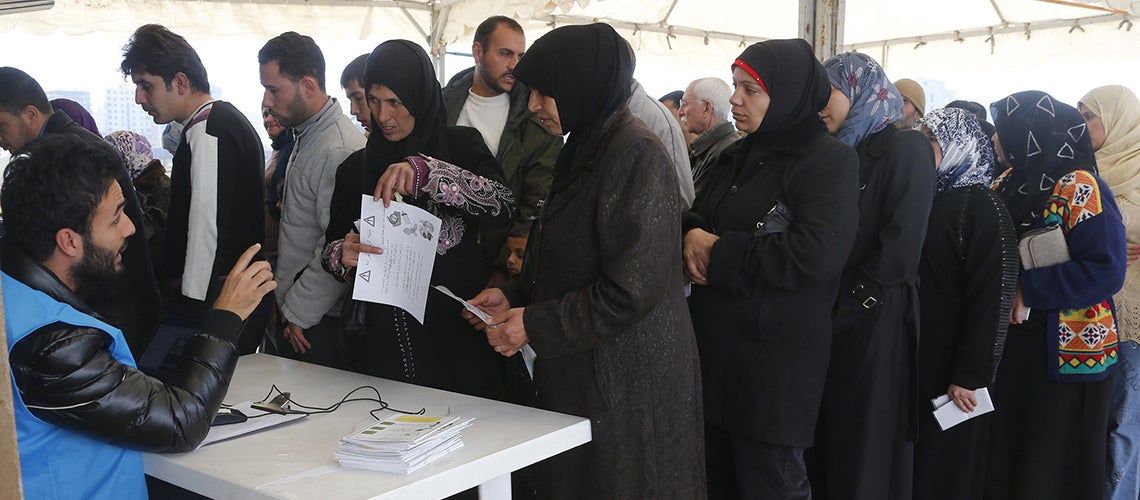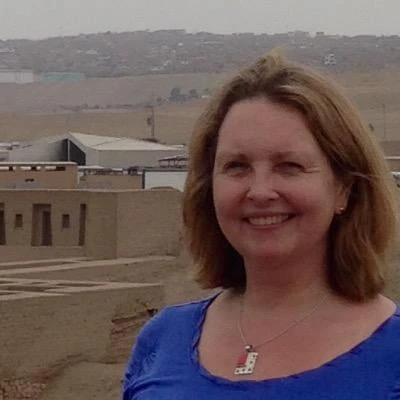 لاجئون يصطفون أمام مركز التسجيل التابع لمفوضية الأمم المتحدة العليا للاجئين في طرابلس بلبنان. © محمد أذاكير/ البنك الدولي
لاجئون يصطفون أمام مركز التسجيل التابع لمفوضية الأمم المتحدة العليا للاجئين في طرابلس بلبنان. © محمد أذاكير/ البنك الدولي
Proof of identity is needed for almost every aspect of modern life, from getting a job and opening a bank account to traveling, voting, and getting healthcare and social welfare. Yet, the World Bank’s ID4D Initiative estimates that globally, 1 billion people struggle to prove their identity – and women and girls are disproportionately affected. The 2017 ID4D Findex revealed that gender gaps in access to identification are particularly large in low-income economies, where close to 45 percent of adult women, compared with 28 per cent of men lack a national ID or similar foundational identity document.
Achieving Universal Access to ID: Gender-based Legal Barriers against Women and Good Practice Reforms paper explores the global extent and impact of regulatory and legislative barriers preventing women from obtaining identification. It looks specifically at four areas of identification: national ID cards, passports, birth registration and certification, and nationality.
In some countries, there are different rules for women and men obtaining national ID cards:
- In Egypt, for example, the ID card of a married woman must show the name of her husband, whereas a married man’s card just shows his marital status.
- Even when legal barriers have been removed, change can be slow: in Afghanistan, a 2010 legal amendment eliminated the requirement for women to bring a male witness to renew an identification document, but this is inconsistently enforced. Women also face challenges registering a child’s birth.
- In Barbados, Burundi, Fiji, Iran and Namibia, a mother can legally register a newborn only when the father is dead, absent, or incapable.
- In Greece too, the legal obligation rests with the father; in his absence, it falls on the doctor or midwife.
Women commonly face many barriers when applying for a passport. While Saudi Arabia recently announced reforms, the written permission of a male guardian or husband is still needed for a married woman to be issued a passport in Gabon and Iran. In Yemen and Sudan, a married woman may be added to her husband’s passport instead of receiving her own document. And in several countries, married women must name their husband and unmarried women must declare their marital status, while married and unmarried men do not need to do so.
Even when requirements are equal for men and women, they can be more burdensome for women. For example, in Burkina Faso’s election of 2010 a birth certificate was required for voter registration which, for those who did not already possess one, required two witnesses such as a mother and midwife to vouch for their birth in the country. This is harder to obtain for women because they, unlike men, leave their birth villages when they marry and, as a result, female voter registration was overwhelmingly low.
Yet little evidence exists on gender differences in non-legal barriers to accessing ID. ID4D is conducting research in Nigeria to increase knowledge about when and how gender-based barriers to accessing ID arise.
Several countries prohibit women from conferring nationality on their children or non-citizen spouses, a right that is almost universal for men. This can perpetuate a cycle of statelessness which has profound consequences, including the lack of civil, political, economic, social and cultural rights. Unmarried women cannot confer nationality on their children in the same way as unmarried men in 18 countries, and in Brunei Darussalam, Kuwait, Lebanon and Qatar, only the father can confer nationality on children. In Kuwait, Qatar, and Somalia, a mother is not allowed to pass her nationality to children born out of marriage or to an unknown father.
Refugees face added obstacles to obtaining proof of identity needed to claim legal rights and access all kinds of services in host communities as documents are often lost as a result of their displacement, and they struggle to obtain new ones. And it affects many: The number of people fleeing war, persecution and conflict exceeded 70 million last year. In Lebanon and Jordan, Syrian refugees have faced complex and lengthy procedures to register and certify births. Many Syrian women refugees, who are often separated from their husbands, lack necessary documentation to prove their marriage and the paternity of their children, which can make a child stateless .
Across all four of these areas relevant for identification—passports, national IDs, birth registration, and nationality—we found that countries that were able to change discriminatory laws had common success factors, including:
- champions at the highest level of government,
- a context of social norms shifting toward greater gender equality, and
- civil society participation, including leadership from women’s groups.
These reforms have wide-reaching, positive impacts: In Pakistan, it has been shown that women with biometric Computerized National Identification Cards feel a stronger sense of identity, are more respected by their families, and have increased self-confidence in sharing opinions on household matters.
To accelerate progress, it is vital to mobilize governments, international organizations, and civil society to raise awareness about the impact of gender-discriminatory laws. International norms have been important at catalyzing change, so UN agencies play an especially important role. The World Bank Group’s Women, Business and the Law project has also contributed to the momentum for reform by raising awareness about the lasting effects of discrimination.
Removing gender-based legal barriers to identification (ID) is vital to achieve goals for poverty reduction and shared prosperity. Without efforts to improve the coverage of ID systems, interventions that aim to increase equitable access to economic opportunities, access to government services, and financial inclusion can only have limited effects.



Join the Conversation